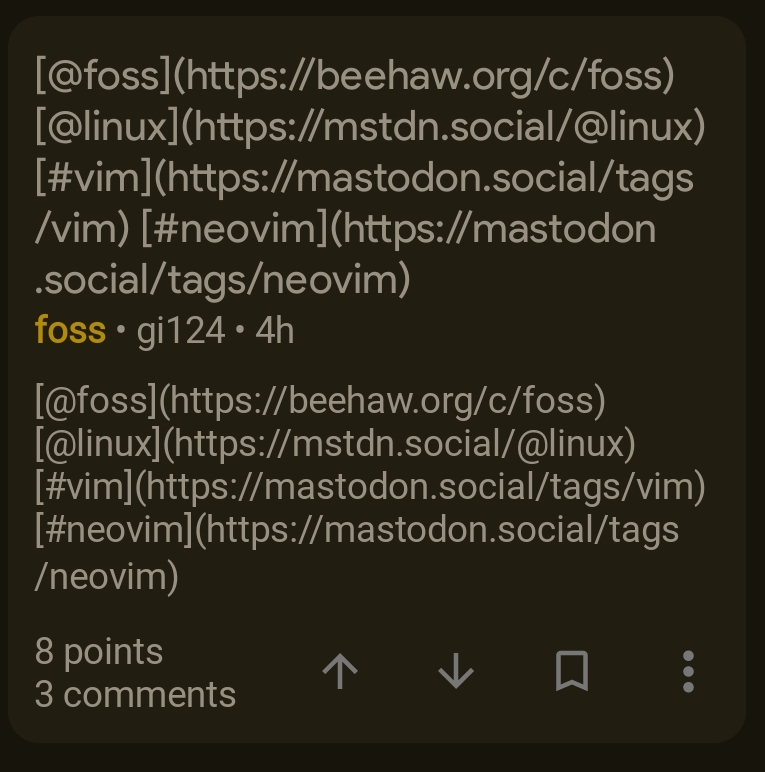If you’re interested, there’s a patch for it that makes it look and behave more like Photoshop.
- 2 Posts
- 14 Comments
[Meta] I don’t think there’s a need to cross-post this within Beehaw. Beehaw is low-activity as it is (in terms of new posts) so most people here would be just browsing new/local so they’d be seeing this post in their feed twice.
Even if you’re not browsing by local, most people in this community would likely also be subscribed to the Technology community as well, so again, there’s a double-up.
For those wondering what this is about:
Kavita is a fast, feature rich, cross platform reading server. Built with a focus for manga and the goal of being a full solution for all your reading needs. Setup your own server and share your reading collection with your friends and family.
Also, apparently you can also set up Tachiyomi to use Kavita as a source, or to track your progress.
If people really felt strongly about this, we would’ve seen it being done already. Perhaps the state of Lemmy right now is “good enough” so folks don’t care too strongly about a lack of a minor feature, or maybe they find it easier to just migrate to something like Kbin instead and still be federated to Lemmy. Or maybe they prefer to just write a simple patch, which can be maintained and distributed separately, instead of forking the entire code. Afterall, it’s easy enough to make a fork, but a PITA to maintain one. Much more easier to just make a separate patch set or standalone utilities or something.
Also, frontend features, like the infinite scrolling one which was quoted, are basically non-issues, considering so many good alternative frontends exist, such as Photon, Alexandrite, mlymm, slemmy, etc. There’s no rule you have to use the default frontend. In fact many Lemmy instances have decided to host these frontends on their own servers, and if they wanted to, they could easily switch to it and make it the default landing page.

 2·10 months ago
2·10 months agoThat’s what I’m saying here. The online circle that considers that transparency and control are the primary reason to choose software at the expense of feature limitations or poor UX is a very small niche
And what I’m saying is, why does that matter here? The argument was about whether or not the opensource world exists, and has nothing to do with how big or small this niche is.
That is important because sometimes open source devs forget about that and don’t focus enough on the things that matter to consumers. And sometimes the open source community, such as it is, will excuse this or even take pride on working around it on the basis of that performative sense of belonging and righteousness. I think that’s a risk for everybody, which is the part that annoys me about it.
I don’t see what’s wrong with that or why it should annoy you? If you disagree with the dev’s philosophy, then fork the software and fix it yourself, that’s the beauty of opensource - you don’t need to agree with the dev or wait for them. And if you don’t have the skills to fix it yourself, sponsor someone who can. Or just use a different software. No one’s holding a gun against your head and forcing you here. There’s no reason it should annoy you.

 2·10 months ago
2·10 months agoCould have fooled me, because I have maybe half a dozen Android installs on devices that run all the same applications and are functionally identical to any manufacturer version out there without being related to them at all.
???
there is no major concern for most people about where their Android build is sourced as long as it runs Android apps.
And that’s not my point at all. As I mentioned earlier, I only mentioned Android because it’s the only mainstream mobile OS which allows sideload apps and has alternative app store. Whether Android in itself is opensource or not is irrelevant in this context, when I’m discussing specifically about Android apps, as an example. Also, I never claimed it was a concern for “most” people, and again, that’s besides the point.
the open source “world” is not dictated by being built on open source code and instead dictated by a label of purity based on the lack of proprietary, monetized or closed source portions then… yeah, that’s annoying. It’s computer veganism
Actually, it isn’t. It (the motivation for opensource) has nothing to do any of the things you mentioned, but more about transparency and control for end users (and faster development lifecycles for developers). As I’ve repeatedly mentioned, people are increasingly getting sick of their apps being filled with ads and trackers and all the corporate spying and data harvesting, and the general enshittification of services. Which is one of the factors driving end users seeking out opensource software.

 3·10 months ago
3·10 months agoPeople on Android are on an open source OS
No they’re not, at least, not by default. The Android that’s pre-installed on most phones is actually closed source, the only reason I mentioned Android is because it’s the only mainstream mobile OS which allows you to sideload apps and even install alternative app stores. There’s regular threads here and even back on Reddit showcasing opensource apps, and even people asking for opensource alternatives.
There’s most certainly an opensource world, whether you acknowledge it or not, and I don’t see why it’s “annoying”.

 5·10 months ago
5·10 months agoPeople mostly just use software. Software is either good or bad. It’s either monetized or it isn’t.
This is true, but also, this ideology is mainly seen in Windows of macOS users - these users they just use software.
But there most certainly is a “world of open source”, and you usually enter that world when you switch to an opensource OS like Linux. And the reason why it’s a whole new world is because you’d predominantly use opensource software on such an OS, so you’re going from a world full of mostly proprietary software, to a world full of mostly opensource software - it’s a stark contrast.
So usually, at least for me, any talks of entering the “world of open source” usually begins with switching to, or trying out, an opensource OS. At least on the desktop.
On the mobile space however, particularly in the Android world, there’s been a growing awareness and desire among the privacy conscious people to switch to opensource apps. More and more folks are tired of the ads and tracking and privacy issues that plague proprietary apps typically found on the Play Store, so people have been increasingly looking towards opensource apps, which are free from such annoyances, and as a result, opensource stores such as F-Droid and Droidify have been gaining in popularity.
So there’s most definitely a world of open source out there, and the first step into that word usually beings with people getting fed up with corporations screwing them over, and thus looking for alternatives.

 5·11 months ago
5·11 months agoYou could create your own custom or multi-optic by looking at the existing ones, merging them in a text editor, and hosting the file somewhere accessible, like github.
See https://trystract.com/settings/optics , the top 10k list also has a comment telling you how it was generated, so you could just create your own top 1k or bottom 3K list, just change the
DiscardtoBoost(0)if you want to limit your results to only these sites.

 3·11 months ago
3·11 months agoSo what’s cool or moe about this? The Github page doesn’t list any details on how this is different from Telegram X, no screenshots either.
It’s not FOSS, but have you tried Join? It was basically created as a response to Pushbullet pulling their paywall stunt, so most disgruntled PB users switched to Join. It’s made by the same guy who maintains Tasker btw, joaomgcd.

 8·11 months ago
8·11 months agoThis is what your post looks like btw on Sync. ᕕ( ᐛ )ᕗ


 1·11 months ago
1·11 months agoI’m curious what “basic settings” require you to touch the command line. My elderly mum and dad - who aren’t very tech savvy btw - have been running Linux for nearly a decade now (Xubuntu previously, now Zorin) and haven’t had any major issues in all this time. Admittedly their requirements are pretty basic, but they do all your tasks a typical basic PC user would - surf the web, check emails, work on documents, print and scan stuff, backup files from their phones/USB drives, video chat etc. In fact, the entire reason why I got them onto Linux in the first place was because Windows wasn’t really stable for them - I got tired of having to troubleshoot or reinstall Windows for them all the time. They’d complain about how an update broke something, or how the system was becoming slower etc. But no such issues with Linux. Occasionally I might get a call asking “how do I do this”, but after a few years, these support calls have all but vanished. Linux “just works” for them, it’s rock solid, the GUI is intuitive (at least for Xububtu/Zorin) and they never had to touch the command line.

You should check out Pinta then, I find it easier to use than Paint.net, yet reasonably feature-packed (obviously nowhere near GIMP/Photoshop).